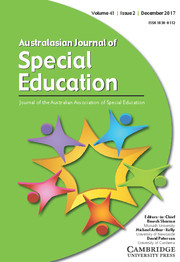Article contents
Commentary on Carter, Stephenson and Strnadová's Reported Prevalence by Australian Special Educators of Evidence-Based Instructional Practices
Published online by Cambridge University Press: 02 March 2012
Abstract
In Volume 35, Issue 1 of the Australasian Journal of Special Education, Carter, Stephenson and Strnadová (2011) replicated a study by Burns and Ysseldyke (2009). In Carter et al.'s study, 194 Australian special educators were asked to rate the extent to which they used eight instructional practices. These practices were applied behaviour analysis, direct instruction, formative evaluation, mnemonic strategies, modality training, perceptual-motor training, psycholinguistic training, and social skills training. The first four of these practices had moderate to high effect sizes (and were regarded by the authors as more desirable techniques), and the final four practices had low effect sizes, on the basis of past meta-analytic research. Carter et al.'s findings were that while the Australian teachers used some desirable strategies relatively frequently, they also used some less desirable practices frequently and so desirable instructional practices should be encouraged at the expense of less effective practices. While these results are of interest, they also have the potential to mislead readers and later sections of the current article examine these potential misconceptions.
- Type
- Commentary
- Information
- Copyright
- Copyright © Cambridge University Press 2011
- 1
- Cited by




